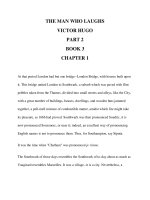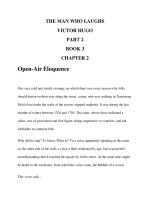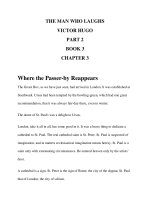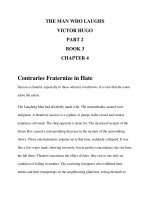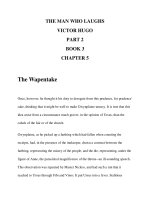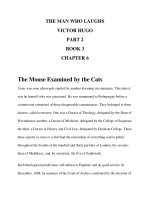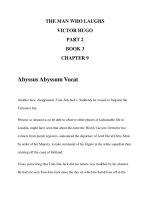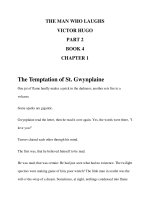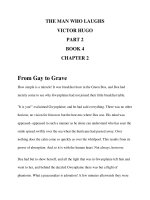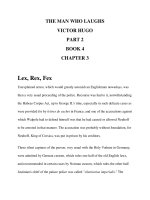THE MAN WHO LAUGHS VICTOR HUGO PART 2 BOOK 5 CHAPTER 1 pdf
Bạn đang xem bản rút gọn của tài liệu. Xem và tải ngay bản đầy đủ của tài liệu tại đây (37.21 KB, 17 trang )
THE MAN WHO LAUGHS
VICTOR HUGO
PART 2
BOOK 5
CHAPTER 1
The Durability of Fragile Things
Destiny sometimes proffers us a glass of madness to drink. A hand is thrust out of
the mist, and suddenly hands us the mysterious cup in which is contained the latent
intoxication.
Gwynplaine did not understand.
He looked behind him to see who it was who had been addressed.
A sound may be too sharp to be perceptible to the ear; an emotion too acute
conveys no meaning to the mind. There is a limit to comprehension as well as to
hearing.
The wapentake and the justice of the quorum approached Gwynplaine and took
him by the arms. He felt himself placed in the chair which the sheriff had just
vacated. He let it be done, without seeking an explanation.
When Gwynplaine was seated, the justice of the quorum and the wapentake retired
a few steps, and stood upright and motionless, behind the seat.
Then the sheriff placed his bunch of roses on the stone table, put on spectacles
which the secretary gave him, drew from the bundles of papers which covered the
table a sheet of parchment, yellow, green, torn, and jagged in places, which seemed
to have been folded in very small folds, and of which one side was covered with
writing; standing under the light of the lamp, he held the sheet close to his eyes,
and in his most solemn tone read as follows:
"In the name of the Father, the Son, and the Holy Ghost.
"This present day, the twenty-ninth of January, one thousand six hundred and
ninetieth year of our Lord.
"Has been wickedly deserted on the desert coast of Portland, with the intention of
allowing him to perish of hunger, of cold, and of solitude, a child ten years old.
"That child was sold at the age of two years, by order of his most gracious Majesty,
King James the Second.
"That child is Lord Fermain Clancharlie, the only legitimate son of Lord Linnæus
Clancharlie, Baron Clancharlie and Hunkerville, Marquis of Corleone in Sicily, a
peer of England, and of Ann Bradshaw, his wife, both deceased. That child is the
inheritor of the estates and titles of his father. For this reason he was sold,
mutilated, disfigured, and put out of the way by desire of his most gracious
Majesty.
"That child was brought up, and trained to be a mountebank at markets and fairs.
"He was sold at the age of two, after the death of the peer, his father, and ten
pounds sterling were given to the king as his purchase-money, as well as for divers
concessions, tolerations, and immunities.
"Lord Fermain Clancharlie, at the age of two years, was bought by me, the
undersigned, who write these lines, and mutilated and disfigured by a Fleming of
Flanders, called Hardquanonne, who alone is acquainted with the secrets and
modes of treatment of Doctor Conquest.
"The child was destined by us to be a laughing mask (masca ridens).
"With this intention Hardquanonne performed on him the operation, Bucca fissa
usque ad aures, which stamps an everlasting laugh upon the face.
"The child, by means known only to Hardquanonne, was put to sleep and made
insensible during its performance, knowing nothing of the operation which he
underwent.
"He does not know that he is Lord Clancharlie.
"He answers to the name of Gwynplaine.
"This fact is the result of his youth, and the slight powers of memory he could have
had when he was bought and sold, being then barely two years old.
"Hardquanonne is the only person who knows how to perform the operation Bucca
fissa, and the said child is the only living subject upon which it has been essayed.
"The operation is so unique and singular that though after long years this child
should have come to be an old man instead of a child, and his black locks should
have turned white, he would be immediately recognized by Hardquanonne.
"At the time that I am writing this, Hardquanonne, who has perfect knowledge of
all the facts, and participated as principal therein, is detained in the prisons of his
highness the Prince of Orange, commonly called King William III. Hardquanonne
was apprehended and seized as being one of the band of Comprachicos or Cheylas.
He is imprisoned in the dungeon of Chatham.
"It was in Switzerland, near the Lake of Geneva, between Lausanne and Vevey, in
the very house in which his father and mother died, that the child was, in obedience
with the orders of the king, sold and given up by the last servant of the deceased
Lord Linnæus, which servant died soon after his master, so that this secret and
delicate matter is now unknown to any one on earth, excepting Hardquanonne,
who is in the dungeon of Chatham, and ourselves, now about to perish.
"We, the undersigned, brought up and kept, for eight years, for professional
purposes, the little lord bought by us of the king.
"To-day, flying from England to avoid Hardquanonne's ill-fortune, our fear of the
penal indictments, prohibitions, and fulminations of Parliament has induced us to
desert, at night-fall, on the coast of Portland, the said child Gwynplaine, who is
Lord Fermain Clancharlie.
"Now, we have sworn secrecy to the king, but not to God.
"To-night, at sea, overtaken by a violent tempest by the will of Providence, full of
despair and distress, kneeling before Him who could save our lives, and may,
perhaps, be willing to save our souls, having nothing more to hope from men, but
everything to fear from God, having for only anchor and resource repentance of
our bad actions, resigned to death, and content if Divine justice be satisfied,
humble, penitent, and beating our breasts, we make this declaration, and confide
and deliver it to the furious ocean to use as it best may according to the will of
God. And may the Holy Virgin aid us, Amen. And we attach our signatures."
The sheriff interrupted, saying, "Here are the signatures. All in different
handwritings."
And he resumed,
"Doctor Gernardus Geestemunde Asuncion A cross, and at the side of it,
Barbara Fermoy, from Tyrryf Isle, in the Hebrides; Gaizdorra, Captain; Giangirate;
Jacques Quartourze, alias le Narbonnais; Luc-Pierre Capgaroupe, from the galleys
of Mahon."
The sheriff, after a pause, resumed, a "note written in the same hand as the text and
the first signature," and he read,
"Of the three men comprising the crew, the skipper having been swept off by a
wave, there remain but two, and we have signed, Galdeazun; Ave Maria, Thief."
The sheriff, interspersing his reading with his own observations, continued, "At the
bottom of the sheet is written,
"'At sea, on board of the Matutina, Biscay hooker, from the Gulf de Pasages.' This
sheet," added the sheriff, "is a legal document, bearing the mark of King James the
Second. On the margin of the declaration, and in the same handwriting there is this
note, 'The present declaration is written by us on the back of the royal order, which
was given us as our receipt when we bought the child. Turn the leaf and the order
will be seen.'"
The sheriff turned the parchment, and raised it in his right hand, to expose it to the
light.
A blank page was seen, if the word blank can be applied to a thing so mouldy, and
in the middle of the page three words were written, two Latin words, Jussu regis,
and a signature, Jeffreys.
"Jussu regis, Jeffreys," said the sheriff, passing from a grave voice to a clear one.
Gwynplaine was as a man on whose head a tile falls from the palace of dreams.
He began to speak, like one who speaks unconsciously.
"Gernardus, yes, the doctor. An old, sad-looking man. I was afraid of him.
Gaizdorra, Captain, that means chief. There were women, Asuncion, and the other.
And then the Provençal. His name was Capgaroupe. He used to drink out of a flat
bottle on which there was a name written in red."
"Behold it," said the sheriff.
He placed on the table something which the secretary had just taken out of the bag.
It was a gourd, with handles like ears, covered with wicker. This bottle had
evidently seen service, and had sojourned in the water. Shells and seaweed adhered
to it. It was encrusted and damascened over with the rust of ocean. There was a
ring of tar round its neck, showing that it had been hermetically sealed. Now it was
unsealed and open. They had, however, replaced in the flask a sort of bung made
of tarred oakum, which had been used to cork it.
"It was in this bottle," said the sheriff, "that the men about to perish placed the
declaration which I have just read. This message addressed to justice has been
faithfully delivered by the sea."
The sheriff increased the majesty of his tones, and continued,
"In the same way that Harrow Hill produces excellent wheat, which is turned into
fine flour for the royal table, so the sea renders every service in its power to
England, and when a nobleman is lost finds and restores him."
Then he resumed,
"On this flask, as you say, there is a name written in red."
He raised his voice, turning to the motionless prisoner,
"Your name, malefactor, is here. Such are the hidden channels by which truth,
swallowed up in the gulf of human actions, floats to the surface."
The sheriff took the gourd, and turned to the light one of its sides, which had, no
doubt, been cleaned for the ends of justice. Between the interstices of wicker was a
narrow line of red reed, blackened here and there by the action of water and of
time.
The reed, notwithstanding some breakages, traced distinctly in the wicker-work
these twelve letters Hardquanonne.
Then the sheriff, resuming that monotonous tone of voice which resembles nothing
else, and which may be termed a judicial accent, turned towards the sufferer.
"Hardquanonne! when by us, the sheriff, this bottle, on which is your name, was
for the first time shown, exhibited, and presented to you, you at once, and
willingly, recognized it as having belonged to you. Then, the parchment being read
to you which was contained, folded and enclosed within it, you would say no
more; and in the hope, doubtless, that the lost child would never be recovered, and
that you would escape punishment, you refuse to answer. As the result of your
refusal, you have had applied to you the peine forte et dure; and the second reading
of the said parchment, on which is written the declaration and confession of your
accomplices, was made to you, but in vain.
"This is the fourth day, and that which is legally set apart for the confrontation, and
he who was deserted on the twenty-ninth of January, one thousand six hundred and
ninety, having been brought into your presence, your devilish hope has vanished,
you have broken silence, and recognized your victim."
The prisoner opened his eyes, lifted his head, and, with a voice strangely resonant
of agony, but which had still an indescribable calm mingled with its hoarseness,
pronounced in excruciating accents, from under the mass of stones, words to
pronounce each of which he had to lift that which was like the slab of a tomb
placed upon him. He spoke,
"I swore to keep the secret. I have kept it as long as I could. Men of dark lives are
faithful, and hell has its honour. Now silence is useless. So be it! For this reason I
speak. Well yes; 'tis he! We did it between us the king and I: the king, by his
will; I, by my art!"
And looking at Gwynplaine,
"Now laugh for ever!"
And he himself began to laugh.
This second laugh, wilder yet than the first, might have been taken for a sob.
The laughed ceased, and the man lay back. His eyelids closed.
The sheriff, who had allowed the prisoner to speak, resumed,
"All which is placed on record."
He gave the secretary time to write, and then said,
"Hardquanonne, by the terms of the law, after confrontation followed by
identification, after the third reading of the declarations of your accomplices, since
confirmed by your recognition and confession, and after your renewed avowal, you
are about to be relieved from these irons, and placed at the good pleasure of her
Majesty to be hung as plagiary."
"Plagiary," said the serjeant of the coif. "That is to say, a buyer and seller of
children. Law of the Visigoths, seventh book, third section, paragraph Usurpaverit,
and Salic law, section the forty-first, paragraph the second, and law of the Frisons,
section the twenty-first, Deplagio; and Alexander Nequam says,
"'Qui pueros vendis, plagiarius est tibi nomen.'"
The sheriff placed the parchment on the table, laid down his spectacles, took up the
nosegay, and said,
"End of la peine forte et dure. Hardquanonne, thank her Majesty."
By a sign the justice of the quorum set in motion the man dressed in leather.
This man, who was the executioner's assistant, "groom of the gibbet," the old
charters call him, went to the prisoner, took off the stones, one by one, from his
chest, and lifted the plate of iron up, exposing the wretch's crushed sides. Then he
freed his wrists and ankle-bones from the four chains that fastened him to the
pillars.
The prisoner, released alike from stones and chains, lay flat on the ground, his eyes
closed, his arms and legs apart, like a crucified man taken down from a cross.
"Hardquanonne," said the sheriff, "arise!"
The prisoner did not move.
The groom of the gibbet took up a hand and let it go; the hand fell back. The other
hand, being raised, fell back likewise.
The groom of the gibbet seized one foot and then the other, and the heels fell back
on the ground.
The fingers remained inert, and the toes motionless. The naked feet of an extended
corpse seem, as it were, to bristle.
The doctor approached, and drawing from the pocket of his robe a little mirror of
steel, put it to the open mouth of Hardquanonne. Then with his fingers he opened
the eyelids. They did not close again; the glassy eyeballs remained fixed.
The doctor rose up and said,
"He is dead."
And he added,
"He laughed; that killed him."
"'Tis of little consequence," said the sheriff. "After confession, life or death is a
mere formality."
Then pointing to Hardquanonne by a gesture with the nosegay of roses, the sheriff
gave the order to the wapentake,
"A corpse to be carried away to-night."
The wapentake acquiesced by a nod.
And the sheriff added,
"The cemetery of the jail is opposite."
The wapentake nodded again.
The sheriff, holding in his left hand the nosegay and in his right the white wand,
placed himself opposite Gwynplaine, who was still seated, and made him a low
bow; then assuming another solemn attitude, he turned his head over his shoulder,
and looking Gwynplaine in the face, said,
"To you here present, we Philip Denzill Parsons, knight, sheriff of the county of
Surrey, assisted by Aubrey Dominick, Esq., our clerk and registrar, and by our
usual officers, duly provided by the direct and special commands of her Majesty, in
virtue of our commission, and the rights and duties of our charge, and with
authority from the Lord Chancellor of England, the affidavits having been drawn
up and recorded, regard being had to the documents communicated by the
Admiralty, after verification of attestations and signatures, after declarations read
and heard, after confrontation made, all the statements and legal information
having been completed, exhausted, and brought to a good and just issue we
signify and declare to you, in order that right may be done, that you are Fermain
Clancharlie, Baron Clancharlie and Hunkerville, Marquis de Corleone in Sicily,
and a peer of England; and God keep your lordship!"
And he bowed to him.
The serjeant on the right, the doctor, the justice of the quorum, the wapentake, the
secretary, all the attendants except the executioner, repeated his salutation still
more respectfully, and bowed to the ground before Gwynplaine.
"Ah," said Gwynplaine, "awake me!"
And he stood up, pale as death.
"I come to awake you indeed," said a voice which had not yet been heard.
A man came out from behind the pillars. As no one had entered the cell since the
sheet of iron had given passage to the cortège of police, it was clear that this man
had been there in the shadow before Gwynplaine had entered, that he had a regular
right of attendance, and had been present by appointment and mission. The man
was fat and pursy, and wore a court wig and a travelling cloak.
He was rather old than young, and very precise.
He saluted Gwynplaine with ease and respect with the ease of a gentleman-in-
waiting, and without the awkwardness of a judge.
"Yes," he said; "I have come to awaken you. For twenty-five years you have slept.
You have been dreaming. It is time to awake. You believe yourself to be
Gwynplaine; you are Clancharlie. You believe yourself to be one of the people;
you belong to the peerage. You believe yourself to be of the lowest rank; you are
of the highest. You believe yourself a player; you are a senator. You believe
yourself poor; you are wealthy. You believe yourself to be of no account; you are
important. Awake, my lord!"
Gwynplaine, in a low voice, in which a tremor of fear was to be distinguished,
murmured,
"What does it all mean?"
"It means, my lord," said the fat man, "that I am called Barkilphedro; that I am an
officer of the Admiralty; that this waif, the flask of Hardquanonne, was found on
the beach, and was brought to be unsealed by me, according to the duty and
prerogative of my office; that I opened it in the presence of two sworn jurors of the
Jetsam Office, both members of Parliament, William Brathwait, for the city of
Bath, and Thomas Jervois, for Southampton; that the two jurors deciphered and
attested the contents of the flask, and signed the necessary affidavit conjointly with
me; that I made my report to her Majesty, and by order of the queen all necessary
and legal formalities were carried out with the discretion necessary in a matter so
delicate; that the last form, the confrontation, has just been carried out; that you
have £40,000 a year; that you are a peer of the United Kingdom of Great Britain, a
legislator and a judge, a supreme judge, a sovereign legislator, dressed in purple
and ermine, equal to princes, like unto emperors; that you have on your brow the
coronet of a peer, and that you are about to wed a duchess, the daughter of a king."
Under this transfiguration, overwhelming him like a series of thunderbolts,
Gwynplaine fainted.
